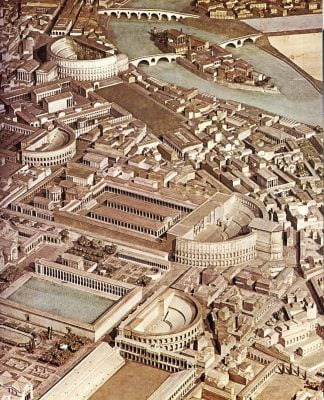The Field of Mars (Campus Martius) was a place in ancient Rome, outside the so-called the Servian walls, in the bend of the Tiber, west of the Capitoline Hill (it does not coincide with the rione Campo Marzio). The area of about 25 hectares in royal times was dedicated to Mars.
According to tradition, the Field of Mars belonged to Tarquinius Superbus, the last king of Rome. After his expulsion from Rome, the king attempted to negotiate the return of the property through envoys and secretly plotted a plot to restore power in the city. After discovering these schemes, the deputies were expelled from the city, and these properties were recognized as state property and dedicated to Mars.
In the 5th century BCE the temple of Apollo was built here, in the 3rd century BCE the temples of Bellona, Janus and Spes, and the Circus of Flaminius; in the 2nd century BCE temples of Hercules and Muses, Juno, Lares and porticos of Metellus and Minucius. In the 1st century BCE, temples of Juturna and Venus Victrix, Tabularium (state archive), porticoes of Philip and Pompey, the theatre of Pompey with the temple of Jupiter Stator and Saepta Julia were built here. Julius Caesar had an artificial lake established here, on which sea battles were staged (naumachia). The first naumachia took place in 46 BCE. The Field of Mars was not included in the city until Emperor Octavian Augustus.
Initially, in the first centuries of the republic, mass open-air events took place here: annual enlistment by consuls, election meetings, comitia centuriata; here the censors conducted a census every 5 years. The development of the Field of Mars was influenced by a decree from 88 BCE, according to which the southern part of the Field was allocated for sale to raise funds for the war against Mithridates VI.
During the empire, the Field of Mars loses its political importance, due to the abolition of comitia centuriata, but many monumental representative objects begin to be built here. During the reign of Augustus, many public buildings were built on the Field of Mars. Thermal baths of Agrippa, Marcellus and Balbus theatres, Pantheon, Ara Pacis Altar, Mausoleum of August, Portico of Octavia. Tiberius erected his triumphal arch here, Nero – triumphal arch, amphitheatre and thermal baths, Domitian – odeon and stadium, Hadrian – triumphal arch, Antoninus Pius – the column and the temple of the deified Hadrian, Alexander Sever – the basilica and thermal baths, Aurelian – the temple of the Sun and the barracks of the city cohort.
In 271 CE Emperor Aurelian, surrounding Rome with new defensive walls, incorporated the Field of Mars into the city complex. The main communication artery of the district was Via Flaminia.






